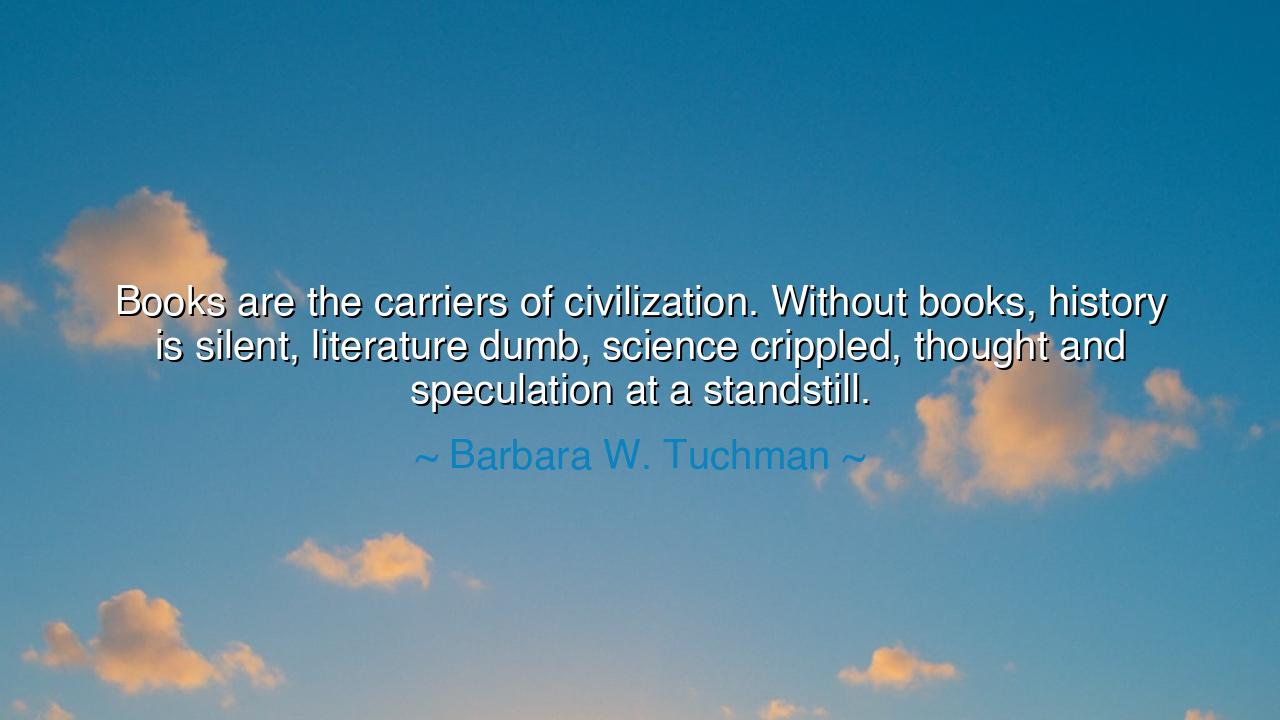
Books are the carriers of civilization. Without books, history is
Books are the carriers of civilization. Without books, history is silent, literature dumb, science crippled, thought and speculation at a standstill.






“Books are the carriers of civilization. Without books, history is silent, literature dumb, science crippled, thought and speculation at a standstill.” — thus spoke Barbara W. Tuchman, historian of wisdom and weaver of human memory. Her words are not mere ornament of thought, but a clarion call to all who walk the path of learning and light. For in her voice we hear the echo of centuries — of monks in cold scriptoria bending over parchment by candlelight, of scholars safeguarding the flame of knowledge against the winds of ignorance, of readers who, by opening a book, opened the very gates of civilization itself.
Books are carriers of civilization because they bear within them the spirit, the thought, the triumph, and the sorrow of humankind. They are vessels crossing the vast sea of time, ferrying wisdom from the ancients to the unborn. Without them, the great story of our species would drift into oblivion — for memory fades, but ink endures. Where words are written, the mind survives its maker. The book is not a dead thing; it is a living soul bound in paper and thread, whispering truths long after its author has turned to dust.
When Tuchman speaks of history being silent, she reminds us of what happens when nations forget their past. The ruins of Alexandria’s Library, once a beacon of human thought, stand as a silent wound in civilization’s body. Thousands of scrolls — the lifeblood of ancient science, art, and philosophy — turned to ash, leaving gaps in our knowledge that no time can fill. The philosophers of Greece, the astronomers of Babylon, the poets of Egypt — their voices were stilled, not by death, but by the loss of their words. That silence is what Tuchman warns against: a silence that kills memory itself.
Likewise, when she says literature is dumb, she speaks to the death of imagination. For without books, there can be no poetry, no stories to stir the heart or teach the soul. Imagine a world without the laughter of Don Quixote, without the dreams of Shakespeare, without the human ache of Tolstoy or Nguyễn Du. A civilization without literature is a body without a heart — it can move, but it cannot feel. Books give us not only knowledge, but empathy; they teach us to see ourselves in others, and others within ourselves.
“Science crippled,” she continues — and how true that is. For science, too, is a story told through books: from the musings of Aristotle to the equations of Einstein. When Galileo’s words were bound and spread, they defied kings and priests alike, carrying the truth of the heavens to minds unshackled. Knowledge recorded becomes knowledge multiplied. Without books, discoveries would vanish with their discoverers, and each generation would be forced to climb the same weary hill of ignorance again.
Even thought and speculation, those free birds of the mind, depend upon the written word to find their wings. For one thinker’s note becomes another’s spark; one idea recorded becomes the foundation of the next. Without books, thought itself stagnates — like a river cut off from its source. Civilization does not advance by memory alone, but by the exchange of ideas through writing, preserved and shared across time.
Consider the tale of Ibn Sina, known in the West as Avicenna, the Persian scholar whose book The Canon of Medicine guided physicians for over six centuries. In it lay the distilled wisdom of the Greeks and Arabs, carried by ink from Baghdad to Paris, from Córdoba to Constantinople. His book outlived empires. While palaces crumbled and rulers fell, his words endured, healing bodies and enlightening minds. Such is the immortal power of the written page — fragile in form, yet stronger than stone.
So let this be the lesson for all who listen: guard your books as you would guard fire in the darkness. Read, so that the flame of civilization does not flicker out. Write, so that your thoughts may become bridges to those who come after you. And teach others to love the written word — for in that love lies the secret strength of humanity. The book is not merely an object; it is a covenant between past and future, a sacred trust of mind and spirit. To turn its pages is to keep that covenant alive, and to keep civilization itself from falling into silence.






AAdministratorAdministrator
Welcome, honored guests. Please leave a comment, we will respond soon